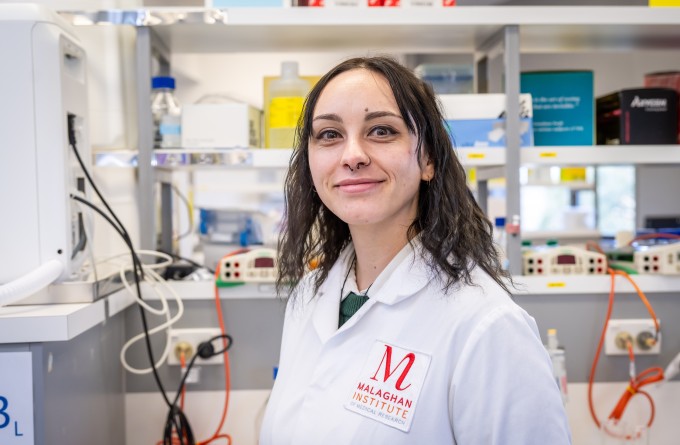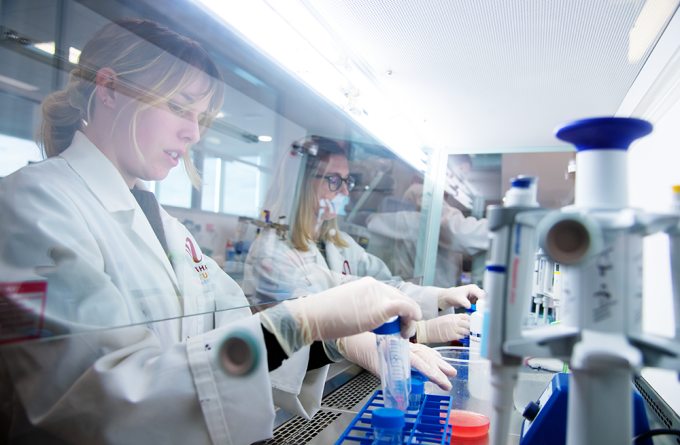13 June 2024
Arguably the most important security guard of our immune system, dendritic cells could be the key to understanding how our immune system responds to allergies. It’s a focus for research officer Abbie Larson from the Ronchese Lab, who is using advanced technologies to evolve our thinking.
Our immune system is a complex network of cells and proteins that work together to defend our bodies from invaders. Dendritic cells are a key player in this defence mechanism, acting like security guards, patrolling our bodies for intruders like bacteria, viruses, or other foreign particles.
“Dendritic cells work by continuously sampling their environment, breaking down any foreign particles they encounter and presenting these fragments to other immune cells. If these fragments are identified as threats, the immune system kicks into action, triggering an immune response,” says Abbie.
“Unfortunately, sometimes dendritic cells can get a little too enthusiastic and can misidentify harmless substances, like pollen or dust as dangerous invaders. This can ultimately cause the symptoms of allergies such as rashes, swelling and inflammation.”
Abbie's research sheds a new light on the role of a specific protein called IRF4. Historically, IRF4 has been widely acknowledged as a requirement for the development of a subset of dendritic cells, but it had also thought to be involved in dendritic cell migration.
“My research re-addresses the role of IRF4 in dendritic cell migration by using newer and more advanced technologies that were unavailable 10 or 20 years ago. We now know more than we ever used to,” says Abbie.
“In the past, dendritic cells have been commonly misidentified as other types of immune cells. At the time, we didn’t have the information or the technology available to be able to distinguish between these cell types. With recent advances in flow cytometry and publicly available datasets, our understanding of what defines a dendritic cell has evolved.”
“Exploring how dendritic cells function both normally and in an allergic setting can provide key insights into how allergies develop. We can apply this knowledge to the development of future therapeutics that could potentially prevent allergies from even developing in the first place.”
“For me, science is an exciting adventure, where every day it feels like I’m a child in a playground, jumbling ideas together to solve problems and to answer questions that fulfil my curiosity.”
Scientific research undergoes continuous evolution and adaptation. New tools, like powerful microscopes or advanced flow cytometry techniques, uncover phenomena that were not previously well understood. Abbie’s research is changing the understanding of a role that was previously associated with IRF4.
“As a scientist, I think it is important to keep in mind that we work in a constantly changing field. Things that we found to be true in the past may not be a true representation of what is really going on. With the ever-evolving knowledge base out there, you have to question everything, and the advancement of amazing new technologies can enable us to do just that,” says Abbie.
“This makes scientific research exciting. For me, science is an exciting adventure, where every day it feels like I’m a child in a playground, jumbling ideas together to solve problems and to answer questions that fulfil my curiosity. It is a bonus that I am also contributing to helping the many sufferers of allergies worldwide.”
Growing up in Dunedin, Abbie never saw science in her future and always thought she’d become a chef or a teacher.
“I never pictured myself as a scientist. I think part of this was because I never had any female role models who were scientists growing up,” says Abbie.
“I didn’t develop an interest in science until I studied nutrition in high school. I loved being able to understand how the food we eat can be processed by the body through a whole bunch of biochemical reactions which can ultimately give us energy for the day.”
Her interest in biology grew and Abbie went to the University of Otago to do her undergraduate in Biomedical Science. During her Honour’s year, she researched the role of a group of proteins in the p53 family and their involvement in the cell cycle within a cancer setting.
“I’d always heard whispers about the amazing research happening at the Malaghan Institute when I was at university. After I graduated, I saw a role advertised in Franca Ronchese’s lab, and I applied straight away. More than four and a half years later, I am still loving every minute of it,” she says.
"I'm fortunate to have strong female role models here, and I'd be honoured to contribute to that legacy in the future."
Related articles

Tracking the journey of the shapeshifting bacteria behind stomach cancer
19 November 2025

Marsden funding to drive discovery and innovation in cancer, allergy and infectious disease research
5 November 2025

How our immune system tackles fungal foes
23 October 2025

Malaghan alumni series: Professor Paige Lacy
14 October 2025

Blood, sweat and cells: The making of New Zealand’s first CAR T-cell trial
24 September 2025

Cancer, measles and allergic disease research funded in latest HRC grants round
19 August 2025
